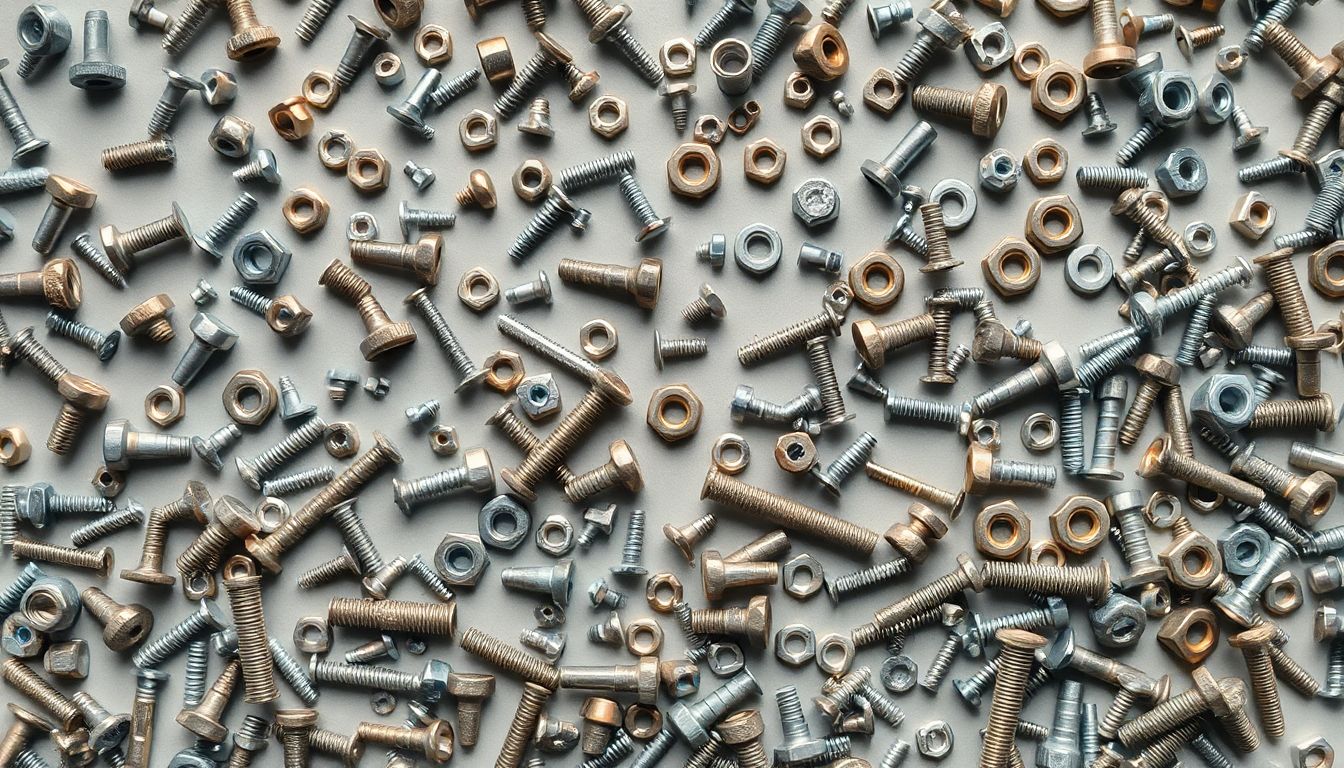
Ever had a shelf collapse? Or a bike part fall off? Chances are, a fastener failed. Fasteners, like rivets, nuts, and screws, are everywhere. They hold our world together, literally.
This guide will explore the world of fasteners. We'll look at different types and uses. You'll learn how to pick the best one.
Rivets: Permanent Champions of Fastening
Rivets create a very strong, permanent joint. They're simple but mighty. A rivet is a metal pin. You insert it through holes and then deform the end. This locks everything together for good. It's very hard to take apart a riveted joint without damaging something. This makes them great for things that need to stay together.
Types of Rivets
Many kinds of rivets exist. Blind rivets, also called pop rivets, are good when you can only reach one side. Solid rivets offer high strength. Structural rivets are often used in aircraft.
Semi-Tubular Rivet – Partially hollow, easy to deform, for softer materials.
Drive Rivet – Hammer-driven, used in one-sided applications.
Blind Rivet – Expands on the opposite side, ideal for inaccessible areas.
Split Rivet – Shank splits and spreads, used for light-duty materials.
Solid Rivet – Traditional, strong, and permanent for heavy-duty applications.
Tubular Rivet – Hollow body, expands during installation, used in sheet metal.
Riveting Techniques and Best Practices
Riveting is straightforward. You need a rivet gun or tool. Insert the rivet, and squeeze the tool. This deforms the rivet. This creates a tight, lasting hold. Make sure the holes are the right size. Too big, and the rivet won't hold. Too small, you'll struggle to get it in.
Nuts and Bolts: The Dynamic Duo of Fastening
Nuts and bolts are partners. Bolts have a head on one end and threads along the shaft. Nuts screw onto these threads. This creates a clamp. Unlike rivets, nuts and bolts can be taken apart. This makes them great for things needing maintenance.
Understanding Bolt Grades and Markings
Bolt markings tell you how strong the bolt is. SAE (Society of Automotive Engineers) and Metric are common standards. Numbers and letters indicate the material and strength. A higher number usually means a stronger bolt. Always use the right grade for the job.
Nut Types and Their Specific Uses
Many kinds of nuts exist, each with a purpose.
Hex Nuts: The standard six-sided nut.
Lock Nuts: These resist loosening from vibration.
Wing Nuts: You can tighten these by hand.
Screws: Precision and Adaptability in Fastening
Screws are like bolts, but they usually taper to a point. They create their own threads as they turn. This makes them useful for joining different materials. Screws offer adaptability and precision.
Screw Head Types and Their Functions
Screw heads come in different shapes.
Flat Heads: Sit flush with the surface.
Pan Heads: Slightly rounded and versatile.
Round Heads: Offer a decorative finish.
The head type affects the look and holding power.
Selecting the Right Screw Thread for the Job
Screw threads can be coarse or fine. Coarse threads are good for soft materials. Fine threads offer a tighter grip in harder materials. Choosing the correct thread is crucial.
Washers: The Unsung Heroes of Fastening
Washers sit under nuts and bolt heads. They spread the load. This stops damage to the surface. They also prevent loosening. Washers might seem small, but are vital.
Types of Washers and Their Applications
Different washers serve different roles.
Flat Washers: General purpose. Spread the load evenly.
Lock Washers: Prevent nuts and bolts from loosening.
Fender Washers: Large diameter. Good for thin materials.
The Importance of Washer Material
Washer material matters. Steel is strong and common. Stainless steel resists rust. Nylon is good for insulation. Pick the right material for the conditions.
Choosing the Right Fastener: A Practical Guide
Picking the right fastener is important. It ensures safety and longevity. Consider the material, load, and environment.
Factors to Consider When Selecting Fasteners
Material Compatibility: Match fastener and material. Avoid corrosion.
Load Requirements: Select a strong enough fastener.
Environmental Conditions: Consider rust and temperature.
Accessibility: Can you reach both sides?
Common Fastener Failures and How to Prevent Them
Fasteners can fail in a few ways.
Corrosion: Use rust-resistant materials.
Stripping: Don't overtighten screws.
Fatigue: Replace worn fasteners.
Conclusion
Fasteners are vital. Rivets are permanent. Nuts and bolts are reusable. Screws offer precision. Washers protect surfaces. Picking the right fastener matters.
When in doubt, ask an expert. Check the manufacturer's guidelines. Your project will be stronger and safer.
Submit for an Online Quote:
Send us (sale803@jiliang988.com) the completed form along with your drawing, and we’ll provide you with a fast and competitive quote.
If you have any questions or need assistance, feel free to contact us. We’re here to help!

 Language
Language








